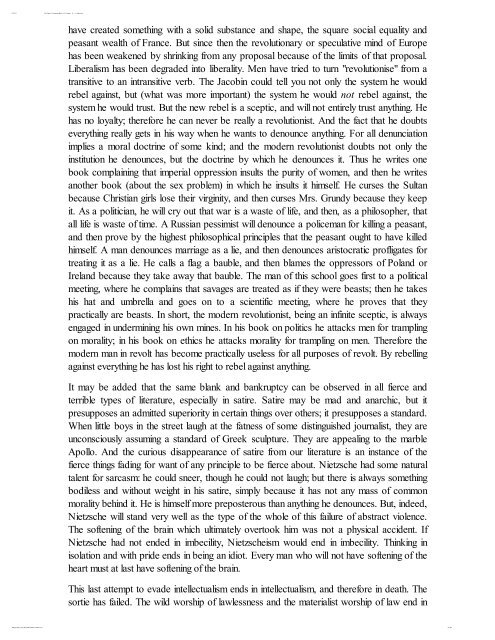Pdf Copy of Orthodoxy, by G.K. Chesterton - Christ United Methodist ...
Pdf Copy of Orthodoxy, by G.K. Chesterton - Christ United Methodist ...
Pdf Copy of Orthodoxy, by G.K. Chesterton - Christ United Methodist ...
Create successful ePaper yourself
Turn your PDF publications into a flip-book with our unique Google optimized e-Paper software.
9/ 27/ 12 The Pr oject G ut enber g eBook <strong>of</strong> O r t hodoxy, G . K. Chest er t on<br />
www. gut enber g. or g/ f iles/ 16769/ 16769- h/ 16769- h. ht m<br />
have created something with a solid substance and shape, the square social equality and<br />
peasant wealth <strong>of</strong> France. But since then the revolutionary or speculative mind <strong>of</strong> Europe<br />
has been weakened <strong>by</strong> shrinking from any proposal because <strong>of</strong> the limits <strong>of</strong> that proposal.<br />
Liberalism has been degraded into liberality. Men have tried to turn "revolutionise" from a<br />
transitive to an intransitive verb. The Jacobin could tell you not only the system he would<br />
rebel against, but (what was more important) the system he would not rebel against, the<br />
system he would trust. But the new rebel is a sceptic, and will not entirely trust anything. He<br />
has no loyalty; therefore he can never be really a revolutionist. And the fact that he doubts<br />
everything really gets in his way when he wants to denounce anything. For all denunciation<br />
implies a moral doctrine <strong>of</strong> some kind; and the modern revolutionist doubts not only the<br />
institution he denounces, but the doctrine <strong>by</strong> which he denounces it. Thus he writes one<br />
book complaining that imperial oppression insults the purity <strong>of</strong> women, and then he writes<br />
another book (about the sex problem) in which he insults it himself. He curses the Sultan<br />
because <strong>Christ</strong>ian girls lose their virginity, and then curses Mrs. Grundy because they keep<br />
it. As a politician, he will cry out that war is a waste <strong>of</strong> life, and then, as a philosopher, that<br />
all life is waste <strong>of</strong> time. A Russian pessimist will denounce a policeman for killing a peasant,<br />
and then prove <strong>by</strong> the highest philosophical principles that the peasant ought to have killed<br />
himself. A man denounces marriage as a lie, and then denounces aristocratic pr<strong>of</strong>ligates for<br />
treating it as a lie. He calls a flag a bauble, and then blames the oppressors <strong>of</strong> Poland or<br />
Ireland because they take away that bauble. The man <strong>of</strong> this school goes first to a political<br />
meeting, where he complains that savages are treated as if they were beasts; then he takes<br />
his hat and umbrella and goes on to a scientific meeting, where he proves that they<br />
practically are beasts. In short, the modern revolutionist, being an infinite sceptic, is always<br />
engaged in undermining his own mines. In his book on politics he attacks men for trampling<br />
on morality; in his book on ethics he attacks morality for trampling on men. Therefore the<br />
modern man in revolt has become practically useless for all purposes <strong>of</strong> revolt. By rebelling<br />
against everything he has lost his right to rebel against anything.<br />
It may be added that the same blank and bankruptcy can be observed in all fierce and<br />
terrible types <strong>of</strong> literature, especially in satire. Satire may be mad and anarchic, but it<br />
presupposes an admitted superiority in certain things over others; it presupposes a standard.<br />
When little boys in the street laugh at the fatness <strong>of</strong> some distinguished journalist, they are<br />
unconsciously assuming a standard <strong>of</strong> Greek sculpture. They are appealing to the marble<br />
Apollo. And the curious disappearance <strong>of</strong> satire from our literature is an instance <strong>of</strong> the<br />
fierce things fading for want <strong>of</strong> any principle to be fierce about. Nietzsche had some natural<br />
talent for sarcasm: he could sneer, though he could not laugh; but there is always something<br />
bodiless and without weight in his satire, simply because it has not any mass <strong>of</strong> common<br />
morality behind it. He is himself more preposterous than anything he denounces. But, indeed,<br />
Nietzsche will stand very well as the type <strong>of</strong> the whole <strong>of</strong> this failure <strong>of</strong> abstract violence.<br />
The s<strong>of</strong>tening <strong>of</strong> the brain which ultimately overtook him was not a physical accident. If<br />
Nietzsche had not ended in imbecility, Nietzscheism would end in imbecility. Thinking in<br />
isolation and with pride ends in being an idiot. Every man who will not have s<strong>of</strong>tening <strong>of</strong> the<br />
heart must at last have s<strong>of</strong>tening <strong>of</strong> the brain.<br />
This last attempt to evade intellectualism ends in intellectualism, and therefore in death. The<br />
sortie has failed. The wild worship <strong>of</strong> lawlessness and the materialist worship <strong>of</strong> law end in<br />
22/ 100





